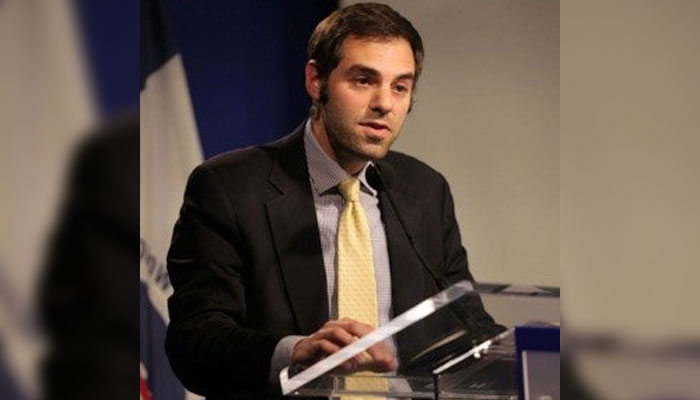World cannot afford to ignore India-Pakistan conflict, says Michael Kugelman
Michael Kugelman, a Washington-based South Asia analyst and columnist for Foreign Policy, discussed through an online address the recent India-Pakistan crisis at a thought-provoking panel discussion titled “South Asia in Crisis: Implications of Pakistan-India Tensions,” in Karachi on Friday.
The discussion was hosted by the Karachi Council on Foreign Relations (KCFR) and moderated by academic Dr Huma Baqai.
Michalel Kugelman’s outlined three main takeaways, including escalation dynamics: He said this was one of the most intense confrontations between India and Pakistan in recent times. Both nations used significant military force, including drones and missiles targeting strategic areas. The crisis did not follow the typical pattern of strike, counter-strike, and de-escalation, showing a heightened willingness to engage in limited conflict under the nuclear umbrella.
Use of Technology: For the first time, he said, drones were used in combat by both sides. Additionally, both countries diversified their defense suppliers, acquiring weaponry from partners like France, Russia, the US, China, Turkey, and Israel. The crisis also highlighted the role of disinformation, particularly through the use of AI-generated deepfakes, intensifying the fog of war.
US Diplomatic Role: Despite initial reluctance, he said, the US intervened diplomatically. Senior US officials were actively engaged with both sides, facilitating talks that led to a ceasefire. The US was driven by concerns over potential nuclear escalation.
Speaking of India-Pakistan relations, the analyst said the bilateral relationship is at its worst point in decades. Previous cooperation and efforts to de-escalate tensions have eroded, with harsh rhetoric from both governments and ongoing punitive measures such as trade halts and treaty suspensions.
US involvement, especially public comments by President Trump and Secretary of State Rubio, caused friction with India, which resists third-party mediation in its disputes with Pakistan. Public discussions of Kashmir by US officials particularly irked New Delhi.
The India-Pakistan crisis underscores persistent global risks despite emerging geopolitical shifts like multipolarity and nontraditional threats (e.g., pandemics, cyber attacks). The enduring India-Pakistan rivalry remains one of the world’s most dangerous flashpoints due to their nuclear capabilities, he said.
Kugelman concludes that the world cannot afford to ignore the India-Pakistan conflict, given its potential to escalate into a nuclear confrontation.
The Karachi Council on Foreign Relations paid tribute to Pakistan’s national heroes, celebrating the valour and achievements of our brave warriors and air force pilots. The event drew a large and diverse audience, including diplomats, civil servants, members of the media, business leaders, legal and economic experts, as well as prominent figures from civil society.
The discussion panel featured Mushahid Hussain Syed, Shabbar Zaidi, Wajeh ul Hassan, and Owais Toseef. The discussion also featured a special video message from Michael Kugelman, a prominent American foreign policy analyst and director of the South Asia Institute at the Wilson Center. A regular columnist for Foreign Policy magazine, he said that Pakistan had changed the power balance of this area.
The session offered a comprehensive analysis of the evolving geopolitical dynamics in South Asia and their implications for Pakistan.
Nadira Panjwani, chairperson of the KCFR, in her opening address, aptly narrated the background and the causes leading to the latest round of hostilities between Pakistan and India. She highlighted the International community’s discriminatory treatment of India and their disregard for the Kashmir crisis.
She paid tribute to the martyrs, the armed forces of Pakistan, the Pakistan media, and the people of Pakistan. She thanked China for its unwavering support for Pakistan.
Senator Mushahid Hussain Syed remarked that May 10th will be remembered as a turning point in history, as it shattered India’s ambitions of positioning itself as the regional power and policing authority in South Asia.
-
 Prince William Should Focus On 'family Business' After Andrew Blunder
Prince William Should Focus On 'family Business' After Andrew Blunder -
 Katherine Schwarzenegger Pratt 'brought To Tears' By Sister-in-law's Gesture
Katherine Schwarzenegger Pratt 'brought To Tears' By Sister-in-law's Gesture -
 Prince William Makes Bold Claim About Britain's Creative Industry At BAFTA
Prince William Makes Bold Claim About Britain's Creative Industry At BAFTA -
 Andrew Mountbatten Windsor Insulting 'catchphrase' That Degarded Staff
Andrew Mountbatten Windsor Insulting 'catchphrase' That Degarded Staff -
 Kate Middleton, Princess Beatrice 'undercurrent Tension' Comes To Surface
Kate Middleton, Princess Beatrice 'undercurrent Tension' Comes To Surface -
 'Grey's Anatomy' Alum Katherine Heigl Reveals Why She Stayed Silent After Eric Dane Loss
'Grey's Anatomy' Alum Katherine Heigl Reveals Why She Stayed Silent After Eric Dane Loss -
 Host Alan Cumming Thanks BAFTAs Audience For Understanding After Tourette’s Interruption From Activist
Host Alan Cumming Thanks BAFTAs Audience For Understanding After Tourette’s Interruption From Activist -
 Jennifer Garner Reveals Why Reunion With Judy Greer Makes Fans 'lose Their Minds'
Jennifer Garner Reveals Why Reunion With Judy Greer Makes Fans 'lose Their Minds' -
 Chris Hemsworth Makes Shocking Confession About His Kids' Reaction To His Fame
Chris Hemsworth Makes Shocking Confession About His Kids' Reaction To His Fame -
 Wiz Khalifa Reveals Unconventional Birthday Punch Tradition With Teenage Son In New Video
Wiz Khalifa Reveals Unconventional Birthday Punch Tradition With Teenage Son In New Video -
 BAFTAs 2026: Kerry Washington Makes Debut In Custom Prada Gown
BAFTAs 2026: Kerry Washington Makes Debut In Custom Prada Gown -
 Jennifer Lopez Gets Emotional As Twins Max And Emme Turn 18
Jennifer Lopez Gets Emotional As Twins Max And Emme Turn 18 -
 Andrew Mountbatten Windsor Blunders Are Result Of 'conspiracy Of Silence'
Andrew Mountbatten Windsor Blunders Are Result Of 'conspiracy Of Silence' -
 Keith Urban Fires Entire Management Team After Divorcing Nicole Kidman
Keith Urban Fires Entire Management Team After Divorcing Nicole Kidman -
 Kylie Jenner Marks Death Anniversary Of Hairstylist Jesus Guerrero With '222' Tribute
Kylie Jenner Marks Death Anniversary Of Hairstylist Jesus Guerrero With '222' Tribute -
 Daniel Radcliffe On How It's Like Seeing New Harry Potter Cast Years Later
Daniel Radcliffe On How It's Like Seeing New Harry Potter Cast Years Later




